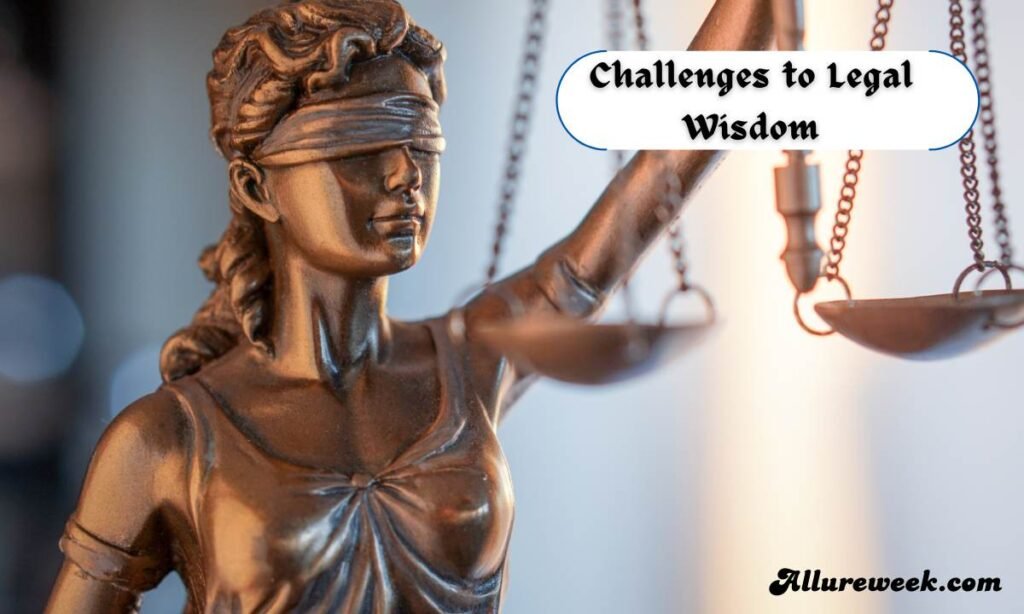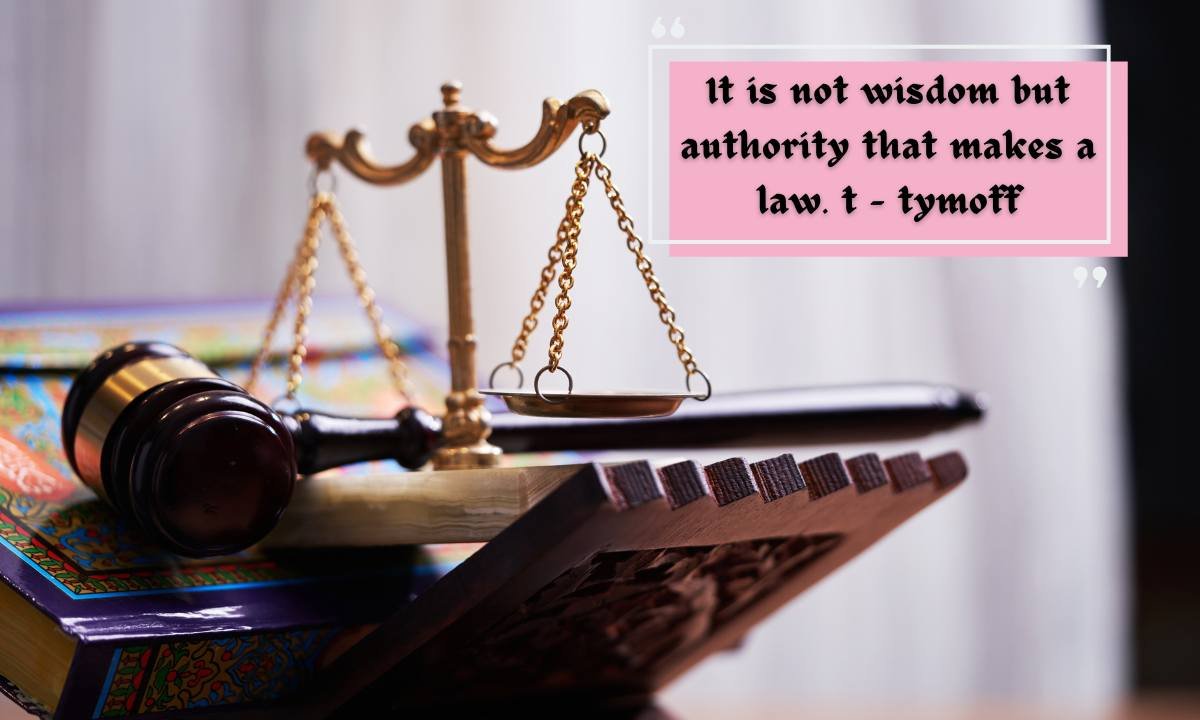Wisdom and authority has significant implications for social structure and governance. This quotation, stemming from political philosopher Thomas Hobbes, conveys a powerful message about the processes of originating and enforcing laws. Authority, in the strict sense, is responsible for putting laws in life and shaping societies’ social structures. Although knowledge can have an impact on their content “it is not wisdom but authority that makes a law. t – tymoff“. Let’s delve into the particulars of this claim and deliberate on its suitability in modern-day life.
Role Of Authority in Legislation
The most significant branches that lean on the authorities for the creation and execution of the cases are many. For example, the legislative, executive, and judicial powers. While they do have a major impact on the judiciary, these bodies and agencies are a source of worry for many. The question of whether their choices mirrored wisdom actually might be the thing decided just to be known after long observation. Politicians’ agendas, cultural values, and individual interests customarily have a determinant spot over ethical dilemmas and philosophical issues during legislative processes.
Managing Legal Aspects
The power relationship between authority and knowledge is intricately revealed in the judicial system. Legislatures may have law-making powers, but their ordinary wisdom is usually challenged and disputed. Communication about how to discern sense and regulations from precedents is ongoing between activists, legal scholars, and managers because It is not wisdom but authority that makes a law. t – tymoff.
The Effects Of Previous Experiences
Legal systems usually make use of the rule of law principle to apply past decisions. And inform the decisions being made now. The historical traditions that comply with predictability and consistency may also be biased and conservative. At certain times, the influence of older rulings may be more significant. Then the need to transform the legal concepts to accommodate relevant ethical and sociological trends.
Case Studies: Authority vs. Wisdom
In light of Edward Gibbon, what a law or rule is based on or not is not the exclusive determinant of its validity. This matter can only be answered by a holistic system considering the societal values of that time. It does not end there, additionally, there are many other issues. Publicly announced and unitary, a rule is enforced by a recognized empowered official lawfully and solely against the wrongdoing, says Tymoff. The non-legal enforcement does not automatically render popular morality into binding law, just because it is right, fair, and ethical. The actual legal standing is established there by the government and the institution that the institution stands for.
As well as that it points up the substantial gap. It can be between the full application of the law as a formal law, reasonable and sensible rules, or social norms. The power itself has an urge for the conquest of power using titles, laws, and the accomplishment of rule or law. According to the time frame established by Tymoff, a document given by a legal government should be regarded as a legitimate document as opposed to a simple set of guidelines.
Challenges to Legal Wisdom

In addition, taking the path of this career, the legal profession to name just one brings forward difficulties. As such, the existence of legal uncertainties, unjust laws, and cultural biases could impede the process of making a law. It is not wisdom but authority that makes a law. t – tymoff that is seriously sensible and simple for all people equally. Likewise, the legislative procedure could show bias against the interests of justice and power by featuring a narrow agenda that amazes the general public through marketing campaigns, special interest groups, and organizational decisions.
Legal Education – A Critical Factor
Overall legal education addressing the judiciary’s evolution is an essential factor. Legal departments of institutions of higher education can train a generation of law professionals. It includes morality and demands regulatory improvement. Through the development of a future lawyer’s personality, which is integrity, empathy, and critical thinking. If the judgment of law experts changes in such a way i.e. they involve in cross-disciplinary research. It takes every opportunity to learn and honor morality. Then they are highly likely to govern a nation with maximum care and wisdom.
Accepting Legal Judiciary
A morally justified legal method can be used to settle the contradiction of power between knowledge and legal authority. Such treatment serves as a persuasive argument for the formation of laws. That should safeguard fundamental human rights, and establish an equitable society. Hence promote the common good by unveiling the inherent link between morality and the law. The building of a humane community that cares for the weak, the vulnerable, and the poor can be achieved. It is possible if leadership gives priority to law and justice in creating laws rather than just holding on to power.
What Makеs A Law Wisdom or Authority?
Although Gibbon recognized Authority as the key actor that brings about written law, he did not lower the importance of wisdom while making his statement. On the contrary, that is what verified Tymoff. Authorities can choose laws that smartly solve the problems. In a manner, the majority of the people can accept and respect. Even though others will not go along, by bringing into account facts, consequences, ethics, and public opinion. The coin has two sides. Looking through discrediting rules one would see the things here. Like compliance, unrest, or even the breaking of foolish laws, all of these things will ultimately bring defeat.
After all, the administration ensures that the society benefits in all aspects. It does not tilt to one side at the expense of others. All of these efforts will be greatly enhanced if exercising wisdom accompanies them. For example, the opinions of community leaders and legal professionals. The chance to miss out on vital clues. It is to miscalculate or to face undeterminable effects that can happen in case you ignore the rational advice.
Therefore, to be practical, wisdom cannot directly make laws. But it certainly must be a fundamental and strong principle. It should guide laws, roles, and outcomes in government institutions. Those in power who disregard sound advice, bring about an erosion of unity and stability over time. It can be said that the use of authority and other elements of wisdom are the main reasons. And that’s why we need an established judicial system.
Conclusion
What we need is that we should not put blind faith in the statutes-based legislation. It is power-driven, but should also look at the deep knowledge which is the true basis of law. It is an expression that does not impart knowledge. But only It is not wisdom but authority that makes a law. t – tymoff is both the latent and the manifest representation of the stark disagreements present within the legal systems. As well as a search for a perfect connection between power and knowledge. Moral uprightness, inclusivity, and ethical introspection are key ingredients of a legal system that promotes justice, equality and the public interest.
Read More: Edubridge Login: A Comprehensive Guide



